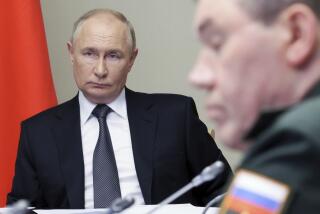Justice for Darfur
Sudanese President Omar Hassan Ahmed Bashir has responded to the International Criminal Court’s warrant for his arrest on charges of war crimes by retaliating against the civilians of Darfur. He ordered the expulsion of 13 international agencies that provide food, water and medical care to more than 4 million Darfuris, offering yet another reason to bring him to justice.
U.N. Secretary-General Ban Ki-moon said the expulsions would cause “irrevocable damage to humanitarian operations,” provoking a new tragedy for people who already have suffered mass murder, rape and torture. At least 300,000 people have died in Darfur in the fighting between ethnic African rebels and Arab militiamen working for the Khartoum government, and 2.7 million have been driven out of their homes. Arguing that peace is more urgent than justice, some African and Arab leaders have criticized the ICC’s decision to issue the warrant now, saying it will destabilize the region and jeopardize an already shaky deal to end the civil war between northern and southern Sudan. This is a false argument; impunity only begets more violence. Their criticism should be directed at Bashir, not at the court.
The U.N. Security Council asked the court to investigate crimes in Darfur in the first place, and has the power to defer the warrant. China, which is a member of the council and buys two-thirds of Sudan’s oil exports, supports that idea. But it would be a mistake. Legal proceedings in the court should not be held up for political purposes. The international community should stand behind the court’s action and press the government of Sudan to stop its collective punishment of Darfuris and fulfill its obligations under the 2005 peace agreement. The Sudanese government is obliged under international law to protect its citizens. World leaders should be pressing Bashir to allow relief in and to prevent further atrocities.
It is unlikely that Bashir will be handed over to international authorities any time soon. The United Nations has no police force to implement the court decision, and Bashir’s cohorts in Sudan aren’t expected to turn him in. Nonetheless, the warrant sends an important message that even sitting heads of state cannot act with impunity. It says that, just like former presidents Slobodan Milosevic of Serbia and Charles Taylor of Liberia, one day Bashir will appear in a court of law to answer for atrocities. Bashir calls the warrant further evidence of “colonialism.” We call it rule of law.
More to Read
Sign up for Essential California
The most important California stories and recommendations in your inbox every morning.
You may occasionally receive promotional content from the Los Angeles Times.









